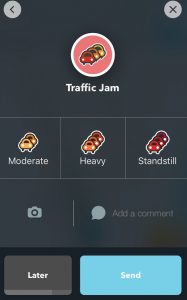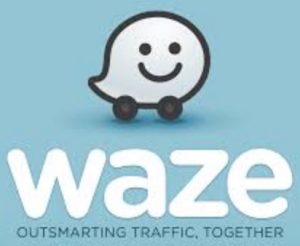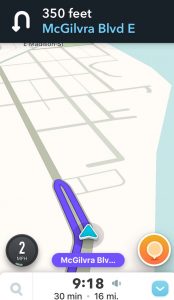Most of us use online driving apps like Waze.
If so – this probably looks pretty familiar. Note in the bottom left corner of the image that it has your speed.
These apps let us tell it all sorts of interesting things like whether there is a hidden police car, or an accident, even a pothole. It also let’s us tell them if we think there’s a traffic jam.
 To do that, you can choose one of these three options, Moderate, Heavy, or Standstill.
To do that, you can choose one of these three options, Moderate, Heavy, or Standstill.
Every time you report something – anything, you get six points. Now these points aren’t useful for anything other than comparing yourself with other drivers, but I suspect this gamification helps Waze collect a lot more data about everything.
Waze is wildly popular. There are Waze users everywhere. And since they know your speed, and they have years of historical data, they already know when there is a Traffic Jam. They can’t infer too many of the other things I mentioned above (an accident or other hazard could be the cause of a slowdown, but it’s still a Traffic Jam).
So if they know how fast you are going and what’s normal, why do they even bother to let you report it? Is it to give you something to do when you are sitting in traffic? Maybe. But there are no rules around when you submit one of these (as I have learned). I can be at zero on my speedometer and report any one of the three Traffic Jam values. I can even report all three of them in succession if I want to and I will get six points for every time.
So what are they really doing?
They are calibrating us – our feedback and how we judge things.
If they know you will report 6 MPH traffic as Moderate, and I consistently report that as Standstill – they have learned something about how we are different. Maybe we just want the six points, but knowing that it doesn’t matter which of the three levels we choose, they learn a little bit about us every time.
It has been reported that the same thing happens in the long surveys we see in places like Facebook. It’s partly to learn our answers to the questions, but it’s also to calibrate our willingness to answer 5 or 50 questions. So before you fill in surveys, or tell Waze something they already know, think about your privacy and what you want to share.
If you watch this TEDx talk, it gets into the ability to get smarter about people and their data patterns.
It will be very interesting to see what Waze and other apps do with us now that we have been calibrated.


Leave a Reply